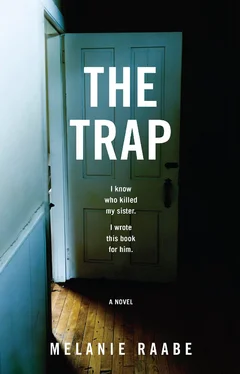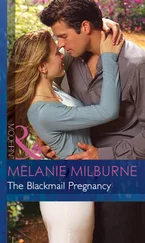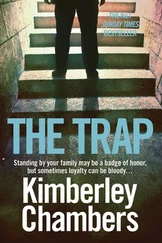“Another interesting character for me is the police officer. Is he based on a real person?”
“No,” I lie. “I have to disappoint you there.”
“Didn’t you consult real policemen when you were working on the book?”
“No,” I say. “I do admire fellow authors who go to such lengths and carry out meticulous research. But I was more interested in the dynamics between the characters. Psychology is more important to me than technical niceties.”
“As I was reading, I had the feeling that the main character and the married police officer had got quite close to one another — that there were the beginnings of a romance there,” says Lenzen.
“Really?”
“Yes! Reading between the lines, I felt that something could have happened.”
“In that case, you know more than the author,” I say. “The two characters like each other; that was important to the story. But that’s as far as it goes — a few moments of complicity, nothing more.”
“Did you specifically avoid incorporating a love story?” Lenzen asks.
I don’t know what he’s driving at.
“To be honest with you, it didn’t occur to me for a second.”
“Do you think you’d write different books if you led a normal life?”
“I believe that everything we do and experience has an influence on the art we produce, yes,” I say.
“If you were in a relationship, then maybe boy would have got girl at the end of the novel?”
I try not to snort. How stupid does he think I am? But it’s a good thing he’s getting personal again, because I’ve had an idea.
“I don’t quite follow your line of reasoning,” I say. “And I’ve already told you that I don’t want to talk about personal matters.” I hope he won’t leave it at that, and my prospects are good, because he’s bound to be under orders to wheedle as much personal information out of me as possible. My new book may be of some interest, but there is no doubt that a glimpse into the psyche of the famous and mysterious Linda Conrads is worth so much more.
“It’s hard to separate the artist from her work,” says Lenzen.
I nod. “But you must also understand that I feel uncomfortable talking about personal matters to a stranger,” I reply.
“Okay,” he says, hesitantly. He seems to be wondering how to continue.
“Do you know what,” I say, then pause, pretending I’ve only recently hit upon the idea, “I’ll answer your questions if, for every question you ask, I can ask one of my own.”
He looks at me in bewilderment, but recovers, conjuring an amused expression.
“You’d like to ask me something too?”
I nod. Lenzen’s eyes blaze. He senses that the preliminary skirmish is now over. He imagines I’m going to open the game at last.
“That sounds fair,” he says.
“Then ask away,” I say.
“Who are the most important people in your life?” asks Lenzen without a moment’s hesitation.
My thoughts stray to Charlotte, who’s still wandering around somewhere in the house, unaware that she met a murderer a moment ago, and maybe a psychopath. To Norbert, who is goodness knows where, but probably fuming. To my parents.
To my sister, who has been dead a long time now, but who has also become the most important person in my life since her death. Like a tune you can’t get out of your head.
Love, love, love, la-da-da-da-da.
“Nowadays, it’s mainly people connected with work,” I say. “My publisher, my agent, the other people in the company, a handful of friends.”
That is vague and it’s best that way. Now it’s my turn. I’ll begin with innocuous questions to find out how Lenzen replies and reacts when he’s relaxed, and then proceed to more provocative questions. Like a lie-detector test.
“How old are you?” I ask.
“What would you guess?”
“I’m asking the questions here.”
Lenzen grins. “I’m fifty-three,” he replies. His eyes narrow.
“Are you in a relationship?” he asks again.
“No.”
“Wow,” he says. That puzzles me.
“Wow?”
“You know what I mean,” says Lenzen. “You’re young, beautiful, incredibly successful. And yet so alone. How on earth do you manage to write about relationships when you’re not in one yourself?”
I do my best to forget everything he’s said and not to wonder if it’s true — that he thinks I’m beautiful, for example.
“It’s my turn,” is all I say. Lenzen shrugs.
“Where did you grow up?” I ask.
“In Munich.”
He’s leaning back in his chair and seems on the defensive.
Maybe my question-and-answer game is more upsetting to him than he’s prepared to admit, even though we’ve only just begun. But it’s his move.
“How do you manage to write about relationships when you’re not in one yourself?”
“I’m a writer,” I say. “I can. Besides, I haven’t always lived the way I live now.”
My move.
“Do you have brothers and sisters?” I ask.
A strike below the belt — hard not to think of my own, dead sister. Lenzen must realize that I’m homing in on the real issue. But he doesn’t bat an eyelid.
“Yes, an older brother. Do you have brothers and sisters?” he asks, returning the question.
Cold-blooded. I control my emotions and simply say, “Yes.”
“Brother or sister?”
“It’s not your turn, Herr Lenzen,” I say.
“You’re very strict, Frau Conrads,” he counters, grinning.
“A sister,” I reply, looking at him steadily. He withstands my gaze.
“Do you have a good relationship with your parents?” I ask.
“Yes,” says Lenzen. “That is to say — my mother is no longer alive. But with my father, yes. And with my mother, too, when she was still around.”
Lenzen’s hand goes to his temple; I’m watching him closely. It’s not what is called a “tell’ in poker — a minute gesture that would reveal that he was lying — because he hasn’t lied yet. I know a great deal about Victor Lenzen. I hope he doesn’t return my last question; I’d prefer not to think about my parents right now.
“Do you miss being in a relationship?” he asks.
“Sometimes,” I say, and go straight to my next question. “Do you have children?”
“A daughter.”
Lenzen takes a sip of water.
“Would you have liked a family?” he asks. “A husband, children?”
“No,” I say.
“No?” he asks.
“No,” I say. “Are you married?”
“Divorced.”
“Why did your marriage fail?”
“My turn,” Lenzen says. “Do you miss sex?” He leans forward again.
“Excuse me?”
“Do you miss sex?” he repeats.
I am scared, but I don’t show it.
“Not much,” I say. Keep going. “Why did your marriage fail?”
“Because I work too much, I suppose, but you’d have to ask my ex-wife.”
Once again, his hand strays to his temple. The question upsets him — all mention of his family upsets him; I must remember that. But I need a lie from him. I want to know what he looks like when he tells a lie. It is, however, his move.
“Do you have a good relationship with your parents?”
“Yes.”
That’s the third lie I’ve told.
“Have you ever had an affair?”
“No,” he replies and plows straight on. “What were you like as a child?”
“Wild,” I say. “More the way you’d imagine a little boy.”
He nods, as if he has no trouble picturing me.
“Have you ever been to a prostitute?” I ask.
“No.”
Impossible to tell whether or not he’s lying.
“Do you have a good relationship with your sister?” he asks. Alarm bells.
“Why do you ask that?”
“Because I’m fascinated by the dynamics between the sisters in your book. You told me earlier that you had a sister, and I wonder whether that’s the reason you describe the love between the sisters with such sensitivity. Well?”
Читать дальше












